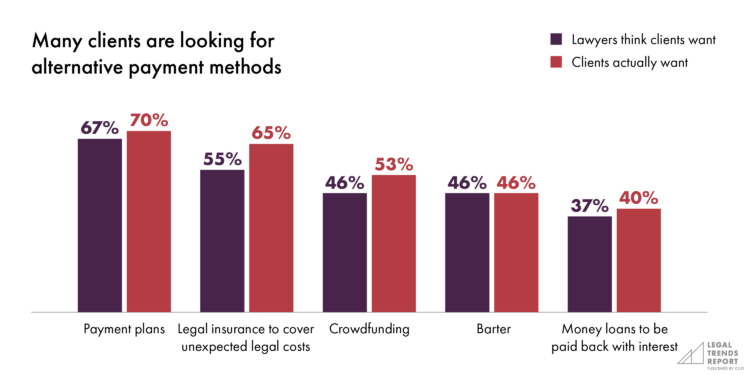
When I first started my law firm, I asked the lawyers I knew how they dealt with legal clients who preferred credit card payments.
The unanimous answer? Not one of them accepted card payments as a payment method.
This was in 2015.
Fast forward almost a decade: most clients now expect to pay legal fees by credit card.
Technology is changing how people pay for things, and your legal clients have become accustomed to the ease that credit cards offer.
In this blog post, we’ll explore:
- Why law firm clients want to pay by debit or credit card.
- How you can offer debit and credit card payments as part of your legal client service.
- Tips and tools that can help your law firm get paid quickly through debit or credit card using legal billing software and online law firm payments.
Legal clients want the option for debit and credit card payments
Your legal clients not only want to pay by debit and credit card—they expect to.
The 2021 Legal Trends Report found that consumers ranked whether a law firm offered payment plans as one of the most important factors for hiring a law firm.
That’s because we live in an age where:
- There are plenty of options for the alternative delivery of legal services.
- Clients have come to expect the instant service and satisfaction they get from Amazon, Netflix, and Uber in every consumer interaction.
The bottom line is: your clients have expectations for who they do business with and they are short on time. They want flexibility, convenience, and ease.
When your law firm is thoughtful, responsive, and engaged with what your legal clients want, you not only make it easier for clients to pay, you experience benefits like getting paid faster, improving collections, setting yourselves apart from the competition, and more.
And if those card payments are made online? Even better. According to the 2022 Legal Trends Report, law firms that increased their revenue year-over-year were much more likely to use online payment processing systems.
Credit card payments put your clients’ needs first
For most people, coming up with a large legal fee isn’t easy. Even if they have the funds, their money may be tied up in an investment or retirement account.
What’s more, potential clients are now also struggling with the burdens of inflation.
Asking clients to pay for significant retainers upfront could result in your clients either opting to handle legal issues on their own or hire a more affordable lawyer should rates increase. On the other hand, having the option to pay by credit card can make things easier as credit card payments allow your client to pay for your legal services over time.
That’s where payment plans come into play.
According to the 2022 Legal Trends Report, 70% of consumers want the option to pay a lawyer via a payment plan. Doing so allows your legal clients to pay via automated payments or fund transfers—giving your firm a competitive edge.

Because of liquidity constraints, clients appreciate the option to break that legal bill up into multiple payments. As debit and credit cards allow them to make automatic payments to your firm, they are a central part of payment plans.
Payment plans can benefit your law firm, too.
That’s because automated payments mean you no longer have to manually collect outstanding bills every month—which can be time-consuming.
This is also why so many law firms are turning to online payment solutions to help make it easy to collect payments.
For instance, online payment solutions, like Clio, make it easy to automatically replenish retainers or break up payments for fixed fee services.
You can accept debit or credit cards, bank transfers online, and your clients can pay through flexible payment plans, accept client funds payments, and be confident that you are compliant with trust accounting rules.
This ultimately allows you to spend more of your precious time practising the law.
Debit and credit card payments can help you get paid faster
Let’s face it: traditional payment transactions by cash or cheque can be a tedious process.
- To pay by cheque, clients typically have to manually write out a cheque, go to the post office to send it, and then your law firm has to deposit it. And in many cases, your clients may not even have chequebooks.
- To pay with cash, you need to meet your clients face-to-face, and then deposit the cash at the bank. These days, more and more people don’t carry cash with them.
In our digitised, 21st century, these options are not exactly convenient. Both of these instances require your law firm clients to visit the bank first to order a chequebook, take out cash, or get a bank draft, adding to the time needed to complete the transaction.
What’s more, in certain situations like a pandemic, or for clients who can’t visit your law office, it may also be difficult to arrange an in-person appointment just so your client can pay your law firm.
By offering debit and credit card payments, you can simply complete the transaction online and even set up automatic payments.
When your law firm accepts debit and credit card payments, you:
- Save valuable time otherwise spent tracking down payments and processing cheques.
- Receive payments sooner.
- Reduce the time between the legal client making a payment and your firm receiving it.
Considerations before accepting debit and credit cards
So, we’ve established that your clients want to pay by debit or credit card and that your firm will see many benefits by integrating them into your practice. But before implementing this payment option, you need to understand the ethics of law firms accepting credit card payments.
There are four ethical questions when it comes to accepting debit and credit cards at a law firm:
- Can I accept payment for legal fees and expenses with a debit or credit card?
- Can I accept the advance payment of fees by debit or credit card?
- Can I pass a surcharge to my client to compensate for the processing fees charged by some debit and credit card processors?
- Can I set up recurring charges for customers once they have stored a credit card on file with my law firm?
As always, different jurisdictions have different ethics rules regarding lawyers accepting card payments. While lawyers can take debit and credit card payments (especially since clients want to pay by card), remember to check your country’s specific rules regarding firms accepting card payments.
How to let clients pay by card
If you’re ready to accept debit and credit cards, one of the first steps is to decide how you’ll accept card payments.
Below are the different ways your law firm can accept cards.

Different ways of accepting debit and credit card payments from law firm clients
Online card payments
One of the easiest ways to meet the needs of clients who want to pay with a debit or credit card is to accept online card payments.
And the good news is that setting up online payments is easy: you just need to provide a payment gateway, a technology that allows you to accept debit or credit card purchases from your clients.
It’s best to find a native payment processor that is specific to the legal industry. That’s because, due to ethics rules, selecting a debit and credit card processing provider involves an extra layer of complexity: you need a debit and credit card processing solution that recognises and accounts for the difference between client accounts (for retainers) and operating accounts (for bill payments).
When deciding which online legal payments provider to go with, make sure that the solution you choose:
- Can schedule recurring payment plans.
- Follows client accounting ethics and is PCI compliant.
- Offers transparent, simple pricing.
- Integrates into your firm’s workflow.
While there are many available online card payment providers, it can be overwhelming to know which one to go with. That’s why we’ve put together a guide to choosing the best law firm credit card processing and debit card processing service.
In-person debit and credit card payments
Although this is another way your law firm can accept debit and credit card payments, it’s a more time-consuming method. It’s also a less client-centred option for accepting payments.
However, for certain clients who can’t access a mobile device or computer to complete their online card payment, your law firm can consider accepting in-person debit and credit card payments.
Some ways of accepting in-person debit and credit card payments include using a payment services provider like Square or Stripe.
Merchant bank accounts
Opening a merchant bank account to accept card payments from your legal clients is another way you can accept card payments.
That said, a debit and credit card processing service and legal payments provider like Clio Payments typically charges lower processing and transaction fees.
For more tips on debit cards, credit cards and online payments for lawyers, visit our payments resource hub.
Tips for getting paid quickly
We’ve established that legal clients want to pay by debit and credit card and that your law firm can benefit from accepting card payments.
What are some other ways you can improve your billing process and increase cash flow? The main ways are to:
- Improve your timekeeping and record-keeping habits so you can accurately collect billed time.
- Bill consistently so clients know when they can expect to pay your law firm.
- Send clients regular billing reminders.
- Accept debit and credit card payments—since clients want to pay by card and there are many benefits to letting them do so.
The bottom line is: when your law firm clients can pay online, you have the ability to manage the entire legal client journey—from the very beginning of client intake and client onboarding, all the way through payment collection. And when you can do that through one secure, compliant, and trusted system, you get paid faster.
Reap the rewards of letting legal clients pay by card
One of the primary reasons your clients want to pay by card is they’re already used to doing so for other purchases and services—and for good reason.
Your law firm benefits, too. That’s because accepting card payments can also help your firm improve cash flow, get paid faster, and provide a better client-centred service. All of this can increase your bottom line.
However, there are some ethical considerations before you choose a card processing service. Be sure to check your jurisdiction’s rules and recommendations surrounding law firms accepting cards, before choosing a debit and credit card processing service.
Want more? We cover 5 ways you can start accepting credit cards at your law firm.
Note: Clio Payments is available to customers in the UK.
Subscribe to the blog
-

Software made for law firms, loved by clients
We're the world's leading provider of cloud-based legal software. With Clio's low-barrier and affordable solutions, lawyers can manage and grow their firms more effectively, more profitably, and with better client experiences. We're redefining how lawyers manage their firms by equipping them with essential tools to run their firms securely from any device, anywhere.
Learn More
